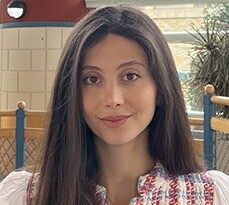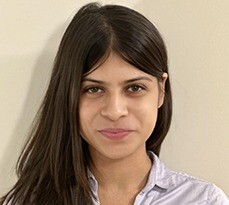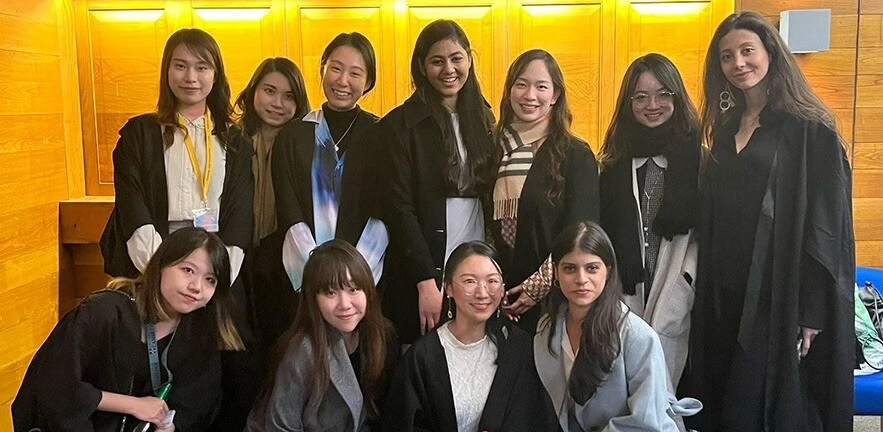We hear from the first recipients of the new Alumni Women in Finance Scholarship on their journey to Cambridge and how their Cambridge Master of Finance (MFin) experience is helping them shape the future of women in finance.
The Alumni Women in Finance Scholarship was launched in 2022 and was made possible thanks to a generous donation by an alumnus of the Cambridge MFin and his wife. Long-standing supporters of the programme, they are both passionate advocates for raising the profile and voice of women working in the finance industry.
The scholarship aims to encourage and support exceptional women, particularly from emerging and developing economies, who are committed to empowering and supporting women within the world of finance. The donors, who have asked to remain anonymous, hope that by highlighting the significant contributions that these women have made early in their career, it will inspire others to contribute in a meaningful way.
“The Cambridge MFin has dramatically increased the number of women enrolled in the programme in the last 5-10 years. The process has been wonderful to be a part of. This scholarship is just a small part of that journey.” They continue, “It is our hope that the scholarship will allow the recipients to dream big and act as mentors to other qualified young women. Ten years from now we hope that Halima and Navnidhi will be leaders in their fields.”
We caught up with the first two recipients of the scholarship to find out about their Cambridge experience so far, how they’ve been getting involved with gender initiatives at Cambridge Judge Business School (CJBS), and their advice for women applying to the MFin.
The journey to Cambridge Judge Business School and the Master of Finance (MFin)

Halima Jalalova Zeynalova came from a successful career in advisory at a ‘Big 4’ company, before starting her MFin. Based in Azerbaijan, she joined the programme to gain a wider perspective of the finance industry.
“Before coming to Cambridge, my knowledge of niche areas in finance was limited. Azerbaijan is a small country with a fast evolving, but still rather traditional, financial system,” she says. “It was about developing a different and wider perspective of financial systems, to understand how things are changing in the global industry and to learn more about the trends in the market. I knew that attending Cambridge is the best way for me to do that.”
For Navnidhi Begwani, she felt it was important to gain some hands-on industry experience before pursuing her master’s degree. After four years at Deloitte in India, working in the financial advisory practice within the forensic team, she felt the time was right to start her MFin.

“It was a really interesting role because it is very dynamic in nature. You’re helping global clients manage integrity and reputational risks that can be critical to making or breaking deals. At the same time, you are helping them turn vulnerabilities into opportunities, so there was a real sense of purpose to the work that I was doing.”
She continues “After four years, I felt it was a good time to take a leap and start my master’s degree. I wanted to delve deeper into credit risk, market risk, the digitalisation of finance and sustainable finance,” she says. “I’m someone who really thrives around people and so the Cambridge programme is the right place for me because it is strongly rooted in helping and empowering its people. The Cambridge ecosystem is very inclusive and when I saw the structure of the programme, it felt like everything just fitted together.”
Overcoming barriers for women
Both women feel that it is important to see more senior female leaders within the finance industry, to inspire women to follow in their footsteps.
For Halima, it is strong leadership that can make a significant and lasting impact. “I have seen how a leader’s sentiment can set a tradition going forward. Coming from a small country, I am grateful having had leaders who showed courage and boldness in extending universal suffrage to women in the Muslim world for the first time – long before many western countries – which set an example for others.”
She feels that there is still a lot of room for improvement in the finance industry. “Women are still not well represented, especially in senior positions. Even in a developed country like the UK, which really promotes gender equality. The target of 30% women in senior investment roles and executive committee positions by 2040 shows that there is still a long way to go.”
Navnidhi agrees that having more women in senior and leadership positions is important. “It really comes from the tone at the top, and how you envision your team in terms of representation. I feel it’s extremely important, particularly in an area like finance, to have empathetic leaders who can make rational and sensitive decisions for both the business and the community.” She continues, “We’ve seen this recently in New Zealand during the pandemic, where a strong female leader led the country out of the COVID-19 crisis with a sensitive yet firm decision-making approach, and a strong sense of conviction and empathy.”
Navnidhi concludes, “We have recognised that there is a problem in the industry, and we do see more companies speaking about the importance of having representation and making the workplace more sustainable for women. So, while we’re still a long way from where we need to be, I feel like we are taking steps in the right direction.”
The Cambridge MFin experience
Female students represent 42% of the 2022/23 class, and Halima enjoys being part of the MFin cohort of women. “I am constantly impressed by the intelligence and expertise of the women in our class. Their out-of-the-box thinking is truly inspiring, and they are excellent representatives of the intellectual capabilities of women. I am confident that their success will motivate and inspire others to pursue their passions with confidence and determination.”
Both women have embraced the wider University community and have been involved with other initiatives for women. Outside of the classroom, Navnidhi has been elected as the Head of Events of the Cambridge University Technology and Enterprise Club. “It’s a very interesting and exciting place to be because it amalgamates technology and enterprise. It provides a platform for student entrepreneurs to take that leap of faith and start up on their own, leveraging the rich resources that the University has to offer.”
As part of her role, she organises events for the club. “The idea is to bring in as many female representatives that we can from the industry, to speak about their experience of being female entrepreneurs. We want to empower those in the Cambridge ecosystem to take that leap as well.”
On College life, Halima adds, “One of the things I like most about Cambridge, which is different from many top business schools around the world, is the College system. Each College is a self-governing community of students from across all disciplines. This allows for a wider network and more diverse collaboration opportunities than the traditional business school model.”
She continues, “The system encourages cross-disciplinary learning and fosters a sense of community and belonging, both within the College and the wider University. In my opinion, the networking and collaboration opportunities that the College system enables are unparalleled and have been a valuable part of my experience here at Cambridge.”
Looking ahead and goals for the future
For Halima, the MFin has opened up new possibilities for her after she finishes the programme. “Currently, there are so many exciting opportunities that I want to pursue! I will soon be part of a team working with the United Nations Environmental Program (UNEP) Finance Initiative as a part of the Group Consulting Project.”
She explains, “The UNEP Finance Initiative brings together a large network of financial institutions, with over $100 trillion AUM, that collectively catalyses action across the financial system to deliver more sustainable global economies. Our team will work on helping these institutions apply the industry framework, particularly Scope 3 emissions, to position their businesses for transition to a sustainable economy. I am already super thrilled about the opportunity.”
Navnidhi sees herself moving into the risk consulting sector after completing the MFin. She explains “I came into the programme with a certain idea about risk, and I already have a more evolved understanding of risk, and of finance in general.” She adds, “I see myself as a finance executive, helping businesses make strategic decisions in finance by being aware of critical vulnerabilities and identifying breakthrough opportunities. I definitely see myself in a leadership role after the MFin. “
Advice to women thinking about applying to Cambridge
As the first recipients of the Alumni Women in Finance Scholarship, both women feel a sense of responsibility towards female students who may be thinking about a future career in finance.
Halima says, “I have already been approached by so many women who want to apply to Cambridge. I am always very happy to share my experience with them.” She suggests that applicants should really think about what they want to achieve from the programme. “Building a network of mentors, peers and professionals who can provide guidance and support can be incredibly helpful in navigating the application process.”
She continues, “Seeking out internships or entry-level positions in the finance industry, to gain practical experience and learn about the industry from the inside, before applying, is a great way to get started. I advise applicants to be proactive in seeking out opportunities and taking on new challenges. If finance is their calling, pursuing a solid education at Cambridge that provides a strong foundation in finance theory and practice is an excellent reason to apply.”
She concludes, “Women have the skills, talent, and ability to excel in the finance industry. They should pursue their passion and not let gender biases hold them back! Cambridge is very inclusive place, and I believe the future of finance will be too.”
Navnidhi agrees and says that she feels a sense of responsibility towards her fellow classmates and the female students who will follow in her footsteps. “I want to do more for women in finance while I’m at the Business School, starting with events and conferences. The kind of conversations I have with my peers and colleagues here at Cambridge Judge are so empowering.” She continues, “In the future I would like to support women, particularly from emerging and developing economies. There are lots of smart minds out there, and I recognise that I have the privilege to be here, but not everyone does. So, to be an enabler is extremely important to me.”
She concludes, “Time really passes quickly when you’re on the MFin programme and you want to make the most of whatever time you have here. It’s wonderful to be a part of the Cambridge ecosystem. It’s a very inclusive place, and a lot of what makes your Cambridge MFin experience special is the people you meet here.”


